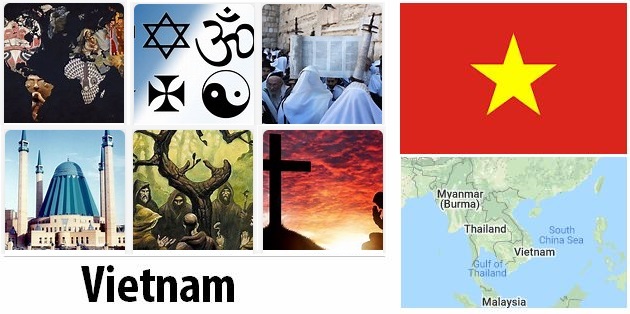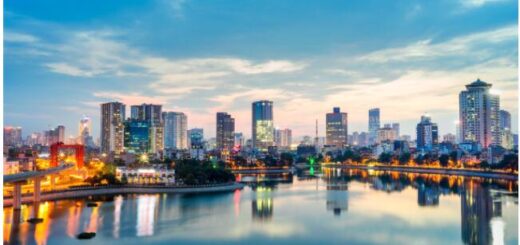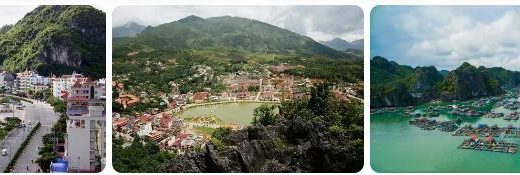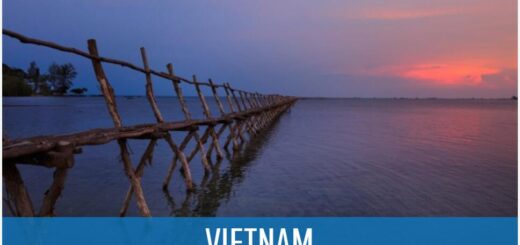Vietnam Religion
In theory, freedom of religion prevails in Vietnam, but in reality the authorities regulate and restrict the practice of religion. In recent years, mainly Protestants and Buddhists have been persecuted by the authorities.
Four out of five residents say they have no religion, but many at least practice some Buddhism or folk religions with elements of, for example, religious belief and ancestral worship. There is also a significant group of Christians.
According to the constitution, no one is allowed to use religion to “break the law”. All religious groups and the majority of priests or the like must be part of a party-controlled body and get permission to conduct business. In the absence of political opposition to the ruling Communist Party, religious leaders have often had to express their displeasure.
Previously, the authorities’ control over religious appointments led to conflict with the Catholic Church’s leadership at the Vatican. This contradiction is now largely annexed as a result of the government’s quest for better relations with the outside world.
Mahayana Buddhism, which dominates Vietnam, has here been given its own form, sometimes described as a “triple religion” along with the education ideal of Confucianism and Daoism’s other faith and mysticism. Only the official Vietnamese Buddhist community is allowed to represent the country’s Buddhists. The regime has intervened severely to limit the influence of Vietnam’s united Buddhist community, which was banned in 1982. Several of its leaders are in prison or house arrest. Nevertheless, the community has many followers.
The Khmer people in southern Vietnam (see Population and Languages) largely adhere to Theravada Buddhism.
Cao dai is a native religion that combines influences from most major religions with strong elements of spiritualism. Cao dai was founded in the 1920s and spread rapidly. Its supporters in the 1950s even had a militarily equipped state in the state. It was located in the province of Tay Ninh in the southwest. Today, cao dai counts at least 2.5 million followers.
Hoa hao developed in the 1930s as a popular interpretation of Buddhism. Like Cao Dai, Hoa Hao early developed an armed branch, which remained active until 1975. Today, Hoa Hao covers at least 1.5 million people.
- Countryaah: Population statistics for 2020 and next 30 years in Vietnam, covering demographics, population graphs, and official data for growth rates, population density, and death rates.
Among Christians, most are Catholics. Protestants are found mainly among minority people in the mountains.
There is also a small group of Muslims in the country. Most of them belong to the cham group of people living in central Vietnam. A significant proportion of cham are also Hindus.
2015
December
Free Trade Agreement signed
After 2.5 years of negotiations, Vietnam and the EU sign a far-reaching free trade agreement that removes more than 99 percent of all trade fees between the parties for up to seven years. Trade between the EU and Vietnam has tripled in value over ten years, to EUR 28 billion in 2015.
November
Transgender persons may re-register gender affiliation
A new law gives transgender persons who have undergone a gender change the right to register their new gender.
The Chinese president visits Hanoi
When Chinese President Xi Jinping visits Hanoi, the two countries agree to maintain peace at sea and have a truly trusting relationship with each other. Xi is the first Chinese president to visit Vietnam in ten years. Xi wants to see increased military cooperation between the countries and that the conflict over the South China Sea will be resolved.
October
Vietnam joins TTP
The Trans Pacific Partnership (TPP) Free Trade Agreement is concluded after five years of negotiations between twelve countries: USA, Japan, Australia, New Zealand, Canada, Mexico, Peru, Chile, Vietnam, Singapore, Brunei and Malaysia. Later, Indonesia also announces that it will sign the TPP agreement. In order to join the TPP, Vietnam promises to strengthen labor law, among other things, it should be legal to form free trade unions. The agreement covers 40 percent of the world economy and provides common standards for trade in the free trade area as well as sharply reduced trade barriers (lower import duties etc). For the agreement to enter into force, the individual parliaments of the countries must adopt the agreement.
August
Journalist is jailed for espionage
A journalist is sentenced to six years in prison for spying on China’s behalf. The journalist worked on a newspaper published by the Ministry of Foreign Affairs and has provided China with information on Vietnamese domestic policy and political leadership in the country since 2011.
Mass amnesty on Independence Day
2 September
In celebrating Independence Day, the government releases 18,298 prisoners from the country’s prisons. None of the released are political prisoners jailed for propaganda against the state or attempts to overthrow the regime. Those released have been convicted of, for example, murder, drug crime, human trafficking or bribery. Vietnam usually carries out mass amnesties at regular intervals. The largest was made in 2009, when 20 599 prisoners were released. This year’s amnesty is the next largest.
Free trade agreement with the EU
The European Union (EU) and Vietnam conclude a Free Trade Agreement. The agreement will enter into force at the end of 2016 or early 2017 and means that the import duties will be gradually abolished.
June
New decree on foreign ownership
The government issues a decree that abolishes certain restrictions on foreign ownership in state-owned companies in about 150 sectors of society. The decision is seen by analysts as an important step towards adapting the Vietnamese economy to international conditions.
May
Another devaluation
The central bank devalues the dong currency a second time in the same year (see January 2015) in an attempt to increase exports and competitiveness in the world market.
Free trade agreement with South Korea
Vietnam enters into a free trade agreement with South Korea in Hanoi. In 2014, bilateral trade between the two countries was $ 30 billion.
February
Release permits are withdrawn
The government suspends the publishing license for the outspoken newspaper Nguoi Cao Tuois website on the internet since it published articles with allegations of “violations of democratic freedoms and rights” by the authorities.
January
The currency is devalued
The Vietnamese central bank devalues the domestic currency dong by one percent to increase the country’s competitiveness in international markets and increase exports. Vietnam is experiencing high growth, which however does not spill over into the economy as a whole due to structural problems, such as many unprofitable state-owned large corporations and other government involvement in the economy.




